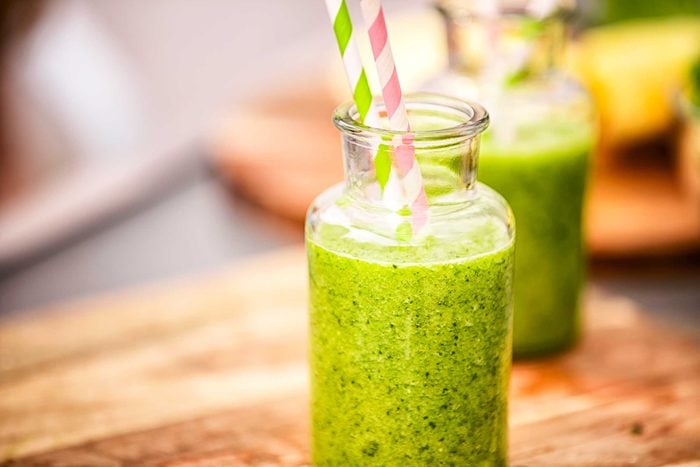
You OD on veggies
If your belly feels a little bigger than usual, don’t freak. “Unless it’s associated with weight loss, nausea, or vomiting, bloating is very common and usually not worrisome,” says Robert Burakoff, MD, clinical chief of gastroenterology, Brigham and Women’s Hospital. It’s often nutritious foods that could be the culprit of a little extra air in your tummy. Chowing down on beans, Brussels sprouts, cabbage, apricots, or carrots can lead to bloat, says Gina Sam, MD, director of the Gastrointestinal Motility Center at Mount Sinai Hospital. (These are more of the 7 worst foods for your belly.) Foods high in lactose, dairy’s main sugar, and foods high in fiber, which can lead to the release of bloating gases hydrogen and methane, can puff you up too, says Dr. Burakoff. If your diet is leaving you bloated, use these nighttime tricks that banish bloat while you sleep.

You eat a lot of ‘diet’ foods
You’ll find the sugar substitute sorbitol in diet soda as well as in certain sugar-free foods and drinks and certain foods marketed as “diabetic.” Snack on this stuff enough, though, and you’ll notice your pants tighten up, says Dr. Sam. Even the sweetener Splenda’s website states “sugar alcohols (such as mannitol, sorbitol, xylitol, lactitol, and maltitol) are sometimes a cause of bloating and diarrhea if too much is eaten.” (Learn more 10 more reasons you should avoid diet soda.) Your best bet is to cut back on the sweet stuff, fake or not—even real sugar can puff you up, says Dr. Sam. Use these 8 surprising ways to eat less sugar to get started.

Your beverage of choice is bubbly
Champagne, soda, and seltzer water might seem like three very different drinks, but the carbonation in a bubbly beverage has the same effect on your stomach. Bubbles expand in your gut and could lead to a slightly bulging belly, says Dr. Sam. Stick to straight water (perk it up with these 10 flavored water recipes) if you’re feeling bloated. Check out these other daily habits that reduce belly bloat.

You drink fruit smoothies all the time
Sweet, refreshing, thirst-quenching—and bloating? Certain fruits, like watermelon, apples, pears, and mangoes, have a high ratio of fructose to glucose (both sugars occur naturally in fruit). This can cause gas and bloating in the estimated one in three people who has difficulty digesting fructose. If this is you, stick to fruits with a more balanced fructose-to-glucose ratio, such as bananas and blueberries. Add this food that can beat belly bloat to fight the bulge while you sip.

You’re constipated
If you’re all backed up down there, your gas likely is, too—which could leave your belly feeling heavy, says Dr. Sam. (Use these home remedies for constipation to feel better fast.) Check your diet, make sure you’re hydrated, and keep up with workouts—but if you feel any abdominal pain, make an appointment with your doc to make sure something else like irritable bowel syndrome (IBS) isn’t at play. Don’t miss these other 9 home remedies for stomach bloat.

You’re on vacation
Almost 50 percent of people become constipated when they travel, says Connecticut-based gastroenterologist Ed Levine, MD. (These are other surprising reasons you might be constipated.) Prevent vacation constipation by sticking to your bedtime and mealtime routines as much as possible. Changes in your circadian rhythm throw off the hormones that help food and waste move through your gut. Plus, eating these foods could cause you to bloat on a plane, so skip them before your next flight.

You’re on a major work deadline
“When you experience fight-or-flight symptoms, like a racing heart, your body diverts blood flow away from your GI tract, which slows down digestion,” says Dr. Levine. Heavy, shallow and rapid breathing, which occurs when you’re under stress, makes you swallow more air than usual and can also lead to bloating. (Learn more about the link between stress and weight gain.) To feel better, simply change your breathing pattern so you exhale for a few counts longer than you inhale. This turns off the stress response and moves your body into a calmer state—especially helpful if you’re experiencing these 8 signs stress is making you sick.

You’ve been skipping exercising
The last thing you may want to do on a “fat day” is lace up your sneakers and squeeze into workout clothes. But physical activity stimulates the muscles of your digestive tract, explains Dr. Levine, which helps move through your GI tract the food and air bubbles that make you feel bloated. (If you’re still not motivated, steal these secrets of women who work out every day.) Ready to start a workout routine? This exercise will flatten your belly in 10 minutes.

You just battled a stomach bug
About 25 percent of patients who get gastroenteritis, a stomach infection, have bloating even after the illness clears. (Here’s how to tell if you’re catching a stomach bug.) A small percentage of those may have small intestinal bacterial overgrowth (SIBO). In SIBO patients, abnormal levels of microbes colonize the small intestine, which can lead to gas and bloating, says Henry Lin, MD, chief of gastroenterology at the New Mexico VA Health Care System. (Don’t miss these other signs you have an unhealthy gut.) Gastroenteritis can disrupt your defense mechanisms that normally keep bacteria out of the small intestine, leading to SIBO. It is typically diagnosed with a breath test and, if it is SIBO, can be treated with antibiotics or other approaches.

You might have IBS
Bloating is one of the most common symptoms of IBS—a disorder that’s characterized by stomach pain and a change in your bowel habits (usually diarrhea, constipation, or both), according to the International Foundation for Functional Gastrointestinal Disorders. It affects between 10 and 15 percent of the population. If you notice these symptoms, see your physician—treatments range from lifestyle changes (like avoiding these 10 foods that make IBS worse) to medications. Here are 7 common stomach pains and what they mean.

You could have Crohn’s disease
If you’re dropping weight, feel nauseous, are vomiting, have a fever, and are bloated, doctors may worry about Crohn’s disease, a chronic inflammatory bowel disease, says Dr. Burakoff. The condition can be mild or severe—it’s best to check in with your physician if you’re noticing a slew of symptoms in addition to bloating. It’s more likely to be Crohn’s if the symptoms are gradual not acute. Watch out for these other symptoms of Chrohn’s disease you might ignore.

In rare cases, bloating can be a sign of cancer
While bloating is likely related to something completely normal and treatable, when accompanied by symptoms like blood in the stool or weight loss, experts do consider more serious diseases like pancreatic, ovarian, or stomach cancer, says Dr. Sam. (Don’t miss these other silent signs of ovarian cancer.) But before you let your mind wander (and end up in a WebMD panic attack), consider your lifestyle and make a real-life appointment to play things safe. Let a doctor—not a website—make that decision for you. These are 15 cancer symptoms women are likely to ignore.
